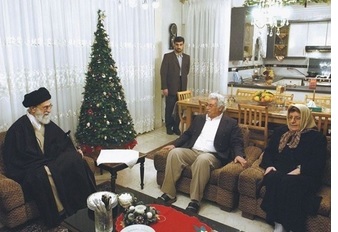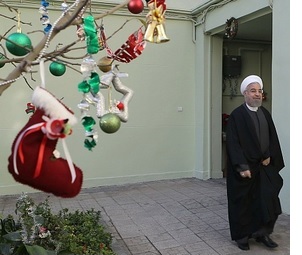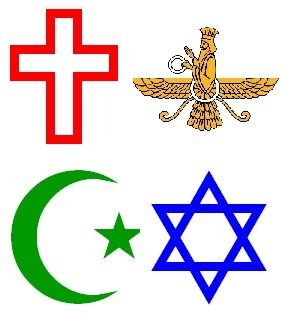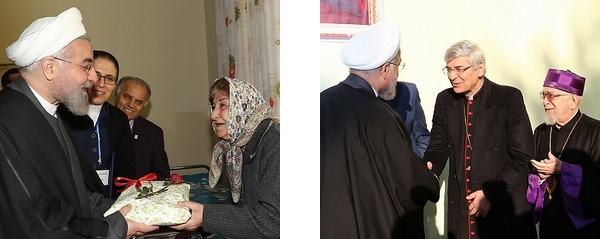Garrett Nada
Iran’s supreme leader and president take two different approaches to interfaith outreach. While extolling the qualities of shared prophets with Christianity and Judaism, Ayatollah Ali Khamenei often censures other countries or groups for supposedly not living up to the high standards set by Jesus, Moses and others. President Hassan Rouhani, on the other hand, focuses on shared values and faith rather than politicizing his messages to or about Jews, Christians and Zoroastrians.
 For Christmas 2014, postings on Khamenei’s official Twitter account mixed praise of Jesus and Mary with backhanded condemnation of the West. Some of the remarks were more than two decades old, repurposed from the pre-Twitter age. Many of his tweets included trending hashtags referring to racial issues in the United States, such as #BlackLivesMatter and #Ferguson — references to the killing of unarmed African-Americans by white police officers in New York and Missouri. Even the caption under a picture of Khamenei visiting with a Christian family (above) had a political overtone. The tweet invoked martyrdom and Jesus because the couple's son died in the 1980-1988 war with Iraq.
For Christmas 2014, postings on Khamenei’s official Twitter account mixed praise of Jesus and Mary with backhanded condemnation of the West. Some of the remarks were more than two decades old, repurposed from the pre-Twitter age. Many of his tweets included trending hashtags referring to racial issues in the United States, such as #BlackLivesMatter and #Ferguson — references to the killing of unarmed African-Americans by white police officers in New York and Missouri. Even the caption under a picture of Khamenei visiting with a Christian family (above) had a political overtone. The tweet invoked martyrdom and Jesus because the couple's son died in the 1980-1988 war with Iraq. President Hassan Rouhani, however, did not mix politics or criticism with his Christmas outreach. The tweet posted on his account was a simple wish for a merry Christmas and a blessing from Jesus, a prophet of "peace and love." Rouhani also visited with elderly Christians at Tehran’s St. Mary Hospice on New Year’s Day. Instead of referring to the Iran-Iraq War, Rouhani used the opportunity to emphasize that all citizens, regardless of age or faith, deserve proper services.
President Hassan Rouhani, however, did not mix politics or criticism with his Christmas outreach. The tweet posted on his account was a simple wish for a merry Christmas and a blessing from Jesus, a prophet of "peace and love." Rouhani also visited with elderly Christians at Tehran’s St. Mary Hospice on New Year’s Day. Instead of referring to the Iran-Iraq War, Rouhani used the opportunity to emphasize that all citizens, regardless of age or faith, deserve proper services.Religious Minorities

• Two seats for Armenian Christians (who number between 40,000 and 80,000)
• One for Assyrian Christians (who number between 10,000 to 20,000) and Chaldean Christians,
• One for Jews (who number 20,000 to 25,000)
• One for Zoroastrians (who number between 25,000 to 60,000)
It's expected that followers of #Jesus follow him in his fight against arrogants and in his support for the oppressed. #BlackLivesMatter
— Khamenei.ir (@khamenei_ir) December 28, 2014Contrary to teachings of #Jesus&prophets, arrogants caused corruption to spread, destroyed family, exploited the poor& spread WMDs. 12/28/91
— Khamenei.ir (@khamenei_ir) December 24, 2014
Today,arrogants claim to follow #Jesus but they took the place of tyrants against whom Jesus spent his life to fight. #KillerIsrael 12/27/00
— Khamenei.ir (@khamenei_ir) December 28, 2014It’s time for all caring Muslims, Christians & Jews to obey the prophets & truly honor #Jesus' birthday by standing up agnst Israeli crimes.
— Khamenei.ir (@khamenei_ir) December 24, 2014
If #Jesus were among us today he wouldn't spare a second to fight the arrogants&support the oppressed.#Ferguson #Gaza pic.twitter.com/P0N8jmKyQU
— Khamenei.ir (@khamenei_ir) December 24, 2014 May Jesus Christ, Prophet of peace & love, bless us all on this day. Wishing Merry #Christmas to those celebrating, esp #Iranian Christians.
— Hassan Rouhani (@HassanRouhani) December 25, 2014
Ayatollah #Khamenei: Enemy interprets fight against #Zionism as #AntiSemitism while #Jews & Muslims coexist peacefully in Islamic countries
— Khamenei.ir (@khamenei_ir) June 7, 2013There are Jews living in various countries;in Iran Jews live respectably 'cuz its their own country but #Zionism is different from #Judaism.
— Khamenei.ir (@khamenei_ir) July 21, 2014Ppl who immigrated to Occupied #Palestine in the name of Jews are greedy ppl& sometimes wicked & killer who are gathered fr across the world
— Khamenei.ir (@khamenei_ir) July 21, 2014#Holocaust is an event whose reality is uncertain and if it has happened, it's uncertain how it has happened.
— Khamenei.ir (@khamenei_ir) March 21, 2014As the sun is about to set here in #Tehran I wish all Jews, especially Iranian Jews, a blessed Rosh Hashanah. pic.twitter.com/tmaf84x7UR
— Hassan Rouhani (@HassanRouhani) September 4, 2013Zoroastrianism and its followers have had a major impact on both Iranian & Islamic culture and civilization. #ZoroastrianWorldCongress
— Hassan Rouhani (@HassanRouhani) December 27, 2013Photo credits: Khamenei.ir and President.ir
